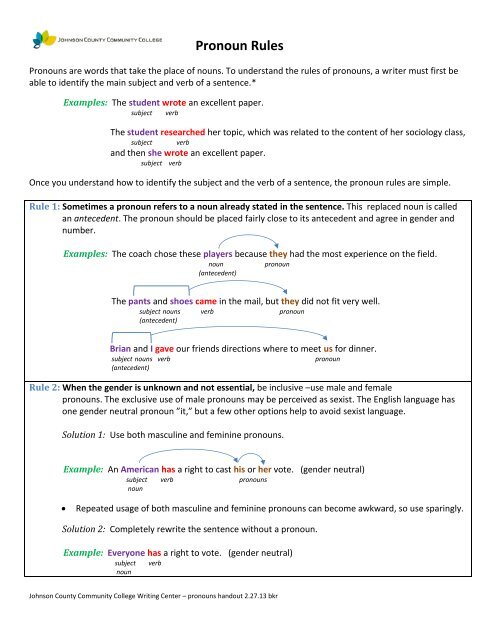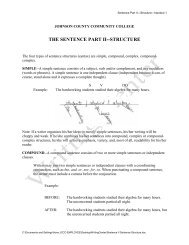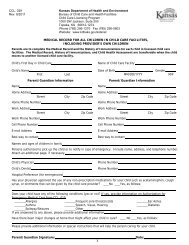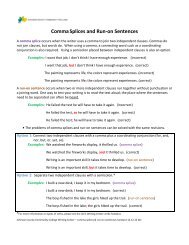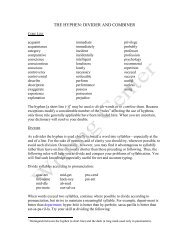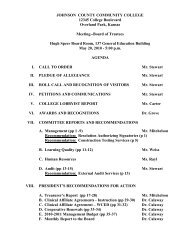Pronoun Rules - Johnson County Community College
Pronoun Rules - Johnson County Community College
Pronoun Rules - Johnson County Community College
You also want an ePaper? Increase the reach of your titles
YUMPU automatically turns print PDFs into web optimized ePapers that Google loves.
<strong>Pronoun</strong> <strong>Rules</strong><strong>Pronoun</strong>s are words that take the place of nouns. To understand the rules of pronouns, a writer must first beable to identify the main subject and verb of a sentence.*Examples: The student wrote an excellent paper.subject verbThe student researched her topic, which was related to the content of her sociology class,subject verband then she wrote an excellent paper.subject verbOnce you understand how to identify the subject and the verb of a sentence, the pronoun rules are simple.Rule 1: Sometimes a pronoun refers to a noun already stated in the sentence. This replaced noun is calledan antecedent. The pronoun should be placed fairly close to its antecedent and agree in gender andnumber.Examples: The coach chose these players because they had the most experience on the field.noun(antecedent)pronounThe pants and shoes came in the mail, but they did not fit very well.subject nouns verb pronoun(antecedent)Brian and I gave our friends directions where to meet us for dinner.subject nouns verb(antecedent)pronounRule 2: When the gender is unknown and not essential, be inclusive –use male and femalepronouns. The exclusive use of male pronouns may be perceived as sexist. The English language hasone gender neutral pronoun ”it,” but a few other options help to avoid sexist language.Solution 1: Use both masculine and feminine pronouns.Example: An American has a right to cast his or her vote. (gender neutral)subject verb pronounsnounRepeated usage of both masculine and feminine pronouns can become awkward, so use sparingly.Solution 2: Completely rewrite the sentence without a pronoun.Example: Everyone has a right to vote. (gender neutral)subject verbnoun<strong>Johnson</strong> <strong>County</strong> <strong>Community</strong> <strong>College</strong> Writing Center – pronouns handout 2.27.13 bkr
Solution 3: Instead of using gender specific pronouns, use the plural form of the subject noun (theantecedent) and the corresponding pronoun. Be sure to check that the verb’s tensematches with the subject.Examples: Everyone has a right to cast his vote. (sexist)subject verb pronounnounAll citizens have a right to cast their votes. (gender neutral)subject verb pronounnounRule 3: <strong>Pronoun</strong> number. Some nouns refer to a class or a group. These collective nouns such as group,committee, and family, use either a singular OR plural pronoun depending on whether the writer isreferring to the group as a single unit OR to the individual members of the group. The meaning of thesentence depends somewhat on the surrounding sentences.Examples: The committee made its decision based on several reports.subject verb singular (as a single unit)nounpronounThe committee put their signatures on the new policy.subject verb plural (as individual members)noun pronounRule 4: When used as subjects, non-count pronouns such as any, anybody, anyone, each, either, enough,everybody, everyone, few, little, many, much, neither, nobody, some, somebody, someone takesingular verbs and singular pronouns.Examples: Neither is going to the concert, so he or she needs to give the tickets away.subject verb subject verbpronounpronounsSomeone needs to take the garbage out, but nobody volunteers to do it.subject verb subject verbpronounpronounRule 5: Geography of <strong>Pronoun</strong> Usage. Subjective/Objective Case has to do with where the pronoun appearsin the sentence. That’s all. If the pronoun appears before the main verb, then it is subjective (I, you,he, she, it, we, they, who). If the pronoun appears after the main verb, then it is objective (me, you,him, her, it, us, them, who, whom).Subjective Examples:He told Carol that the movie was not very good.subjective mainpronoun verbThey expected the professor to attend class.subjectivepronounmainverb<strong>Johnson</strong> <strong>County</strong> <strong>Community</strong> <strong>College</strong> Writing Center – pronouns handout 2.27.13 bkr
Objective Examples:Carol told him that the movie was not very good.main objectiveverb pronounThe professor expected them to attend class.mainverbobjectivepronounProper use of who and whom. The differentiation between using who and whom in speech seems tobe disappearing, but it is still important to distinguish the difference in academic writing. To do so,first determine if the who or whom is referring to the subject or object of the verb. The subject is the“doer” of the verb; the object takes the action of the verb. For subjects, use who; for objects, usewhom.Examples: Who wrote this amazing story?subject verbpronoun● Someone, he or she, wrote the story, so who is used as the subject.Jake gave whom your amazing story?subject verb objectnoun pronoun● The story is being given to someone; whom in this sentence is taking the action of the verb gave.*** Please see the chart at the end of the handout for more examples.Rule 6: Possessive <strong>Pronoun</strong>s are used to indicate ownership. No apostrophes are necessary when usingpossessive pronouns.Example: Mary took her dog for a walk.subject verbnounpossessivepronounnounHis friends brought chips and salsa to the party.possessive subject verbpronoun noun*** Please see the chart at the end of the handout for more examples.*For further explanation of subjects and verbs, please see the JCCC Writing Center subject-verb agreement handout.<strong>Johnson</strong> <strong>County</strong> <strong>Community</strong> <strong>College</strong> Writing Center – pronouns handout 2.27.13 bkr
Types of <strong>Pronoun</strong>sSubjective <strong>Pronoun</strong>s(occurs before the main verb)Iyouhe/she/itwewhotheyMain VerbsawObjective <strong>Pronoun</strong>s(occurs after the main verb)meyouhim, her, ituswhomthemExamples: You saw us. We saw you. They saw her. He saw it. I saw him. She saw them. Who saw us?Possessive <strong>Pronoun</strong>s (indicates ownership)my, mineour, oursyour, yourshisher, hersitstheir, theirswhosetakesmy, mineour, oursyour, yourshisher, hersitstheir, theirswhoseExamples: Mine takes yours. Ours takes hers. Yours takes his. Theirs takes ours. Whose takes mine?These are the basic pronoun rules; for more complex rules, please see Writing Center staff or severalhandbooks available in the JCCC Writing Center.For exercises to practice your pronoun skills, please see Writing Center staff.<strong>Johnson</strong> <strong>County</strong> <strong>Community</strong> <strong>College</strong> Writing Center – pronouns handout 2.27.13 bkr


